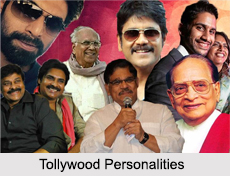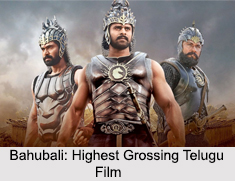 Telugu cinema is based in Film Nagar, a neighborhood of Hyderabad, India. The nickname Tollywood is a portmanteau of the words Telugu and Hollywood. Telugu cinema or tollywood is one of the three largest film industries in terms of the number of films produced every year. Telugu industry holds record of having largest film producing facilities in the world.
History of Telugu Cinema
Telugu cinema is based in Film Nagar, a neighborhood of Hyderabad, India. The nickname Tollywood is a portmanteau of the words Telugu and Hollywood. Telugu cinema or tollywood is one of the three largest film industries in terms of the number of films produced every year. Telugu industry holds record of having largest film producing facilities in the world.
History of Telugu Cinema
History of Telugu films starts in 1912 with silent movie Bhishma Pratigna directed by Raghupati Venkaiah Naidu and R.S. Prakash. This father son duo produced and directed dozens of films in Telugu cinema. In 1931, the first audible movie Bhakta Prahlada was released. H.M. Reddy produced it. Bhakta Prahlada was completed on 15 September 1931, which henceforth became known as "Telugu Film Day" to commemorate its completion. Popularly known as talkies, films with sound quickly grew in number and popularity. In 1934, the industry saw its first major commercial success with Lava Kusha. Directed by C. Pullaiah and starring Parupalli Subbarao and Sriranjani in lead roles, the film attracted unprecedented numbers of viewers to theatres and thrust the young industry into mainstream culture.
In early phase Mythological stories were dominating Telugu industry. By 1936, the mass appeal of film allowed directors to move away from religious and mythological themes. That year, under the direction of Krithiventi Nageswara Rao directed Prema Vijayam, a film focusing on social issues. Its success prompted the production of dozens of other immensely successful `social films`, notably 1939`s Vande Mataram, touching on societal problems like the practice of giving dowry. Telugu films increasingly focused on contemporary living: 29 of the 96 films released between 1937 and 1947 had social themes. It influenced other film makers as well to raise the social issues. The issues like untouchablity, dowry, and feudal system were the subjects of Telugu cinema especially after 1939. In 1943 World War II and resource scarcity made British Raj to impose limit on the uses of filmstrip. It was reduced from 20000 to 11000 feet which decreased the number of production of films comparatively.
In 1938, Gudavalli Ramabrahmam, has co-produced and directed the social problem film, Mala Pilla starring, Kanchanamala, the film dealt with the crusade against untouchability, prevailing in pre-independent India. In 1939, he directed Raithu Bidda, starring thespian Bellary Raghava. The film was banned by the British administration in the region, for depicting the uprise of the peasantry among the Zamindars during the British raj. 1940 film, Viswa Mohini became the first Indian film depicting the Indian movie world. The film subsequently moved to sequel films Savithri and Sathyabhama (1941–42) casting thespian Sthanam Narasimha Rao.
Golden Era of Telugu Cinema
Till this era many individual studios were established, actors and actresses were signed on contract basis and Telugu industry was rising rapidly. In 1950 nineteen Telugu films were released in a year. Bilingual films were also in trend for Tamil and Telugu but the expression problems led to the stoppage of this trend. In 1950 NT Rama popularly known as NTR emerged as another great film personality. Akkineni Nageswara Rao and N.T. Rama Rao duo was a hit duo for telugu cinema and they both worked in 15 films including Palletnori pilla, Gundamma katha, Misamma, Chanakya- Chandragupta etc.
Maya Bazaar, Gumastha, Vinayaka Chavithi, Chandirani and others were made in the 1950 which were quite popular. Malliswari is the first Telugu film which had a public release with thirteen prints along with Chinese subtitles at Beijing on 14, March 1953, and a 16 mm film print was also screened in the United States. The film was directed by Bommireddy Narasimha Reddy, a recipient of the Dada Saheb Phalke Award, and the Doctor of Letters honour.
Relangi, and Ramana Reddy were a comedy double act during this era. Nartanasala won the best art direction award at the Afro Asian film festival in Jakarta. Donga Ramudu directed by K. V. Reddy was archived in the curriculum of the Film and Television Institute of India. Nammina Bantu received critical reception at the San Sebastián International Film Festival. 1967 film Ummadi Kutumbam was selected by Film Federation of India as one of its entries to the Moscow Film Festival. The 1968 cult classic Sudigundalu was screened at the Tashkent and Moscow Film Festivals.
 Development in Telugu Industry
Development in Telugu Industry
Moola Narayana Swamy and B. N. Reddy founded Vijaya Vauhini Studios in 1948 in the city of Chennai. Indian film doyen L. V. Prasad, who started his film career with Bhakta Prahlada, founded Prasad Studios in 1956 based in Chennai. However, through the efforts of D. V. S. Raju, the Telugu film industry completely shifted its base from Chennai to Hyderabad in the early 1990s, during N. T. Rama Rao`s political reign.
About 245 Telugu films were produced in 2006, the highest in India for that year. Film studios in Hyderabad, developed by D. Ramanaidu and Ramoji Rao, are involved in prolific film production and employment. The Film and Television Institute of Telangana, Film and Television Institute of Andhra Pradesh, Ramanaidu Film School, etc. are some of the largest film schools in India. The Telugu states consist of approximately 2800 theaters, the largest number of cinema halls in any state in India.
Modern Era of Telugu Cinema
Bapu`s directorial venture Sakshi was showcased at Tashkent International film festival in 1968. In 1976, he directed Sita Kalyanam that critically acclaimed at the BFI London Film Festival and Chicago International Film Festival, and is part of the curriculum at British Film Institute. Pan-Indian film Oka Oori Katha (1977) won special awards at Karlovy Vary International Film Festival and Carthage Film Festival.
Sankarabharanam won the Prize of the Public at the Besançon Film Festival of France in the year 1981. B. Narsing Rao scripted and produced Maa Bhoomi which was showcased at Karlovy Vary Film Festival, and Cork Film Festivals. He directed, Daasi and Matti Manushulu which won the Diploma of Merit awards at the 16th, and 17th Moscow International Film Festivals in 1989 and 1991 respectively. M. V. Raghu`s Neo-realistic film Kallu (1988), scripted by Gollapudi Maruti Rao has received 30 state awards and has garnered special mention from the CBFC Jury.
Vanaja (2006) won several international awards including the first prize in the live-action feature film category at the Chicago International Children`s Film Festival. Dream (2012), has garnered the Royal Reel Award at the Canada International Film Festival. 2013 Social problem film Naa Bangaaru Talli won Best Film award at the Trinity International Film Festival in Detroit, and four Awards at the Indonesian International Film Festival. 2014 film Minugurulu was selected as Best Indian Film at the 9th India International Children`s Film Festival, held at Bangalore. 2014 film Parampara has garnered the Platinum Award for Best Feature at the International Indonesian Movie Awards. 2018 biographical film Mahanati based on the life of veteran actress Savitri has garnered the "Equality in Cinema Award" at the 2018 Indian Film Festival of Melbourne.
Artists Telugu Cinema
Directors guide the whole team together and get the best out of the cast as well as the crew through his creative vision. Some important directors are S. S. Rajamouli, Padma Shri K.Viswanath, K.V.Reddy, L.V.Prasad, Adurthi Subba Rao, Vedantam Raghavaiah, Dasari Narayana Rao etc.
Not only directors, music directors, actors and singers also made tollywood glorious with their works. Mani Sharma has made music for over 100 movies. A.R. Rahman is also an influential name known his music touching the shores of every continent. He has been awarded two Grammy Awards, a BAFTA award, a Golden Globe, four National Film Awards, dozens of Filmfare Awards, two Academy Awards and most importantly Oscars.
Awards of Telugu Cinema
The Nandi Awards is the most prominent government funded award ceremony for excellence in the production of Telugu Film, Theatre and Television. It is presented annually at Lalitha Kala Thoranam in Hyderabad, by the Film, Television and Theatre Development Corporation of the Telugu state.
Other state awards of Telugu industry are Raghupathi Venkaiah Award, NTR National Award, B. N. Reddy National Award, S. V. Ranga Rao Award for Best Character Actor, Akkineni Award for Best Home-viewing Feature Film, Nagi Reddy Chakrapani National Award etc. Major film awards are Filmfare Awards South, IIFA Utsavam, South Indian International Movie Awards etc.
The Telugu films have great opportunities in the future as this film industry is blessed with talented Telugu actors and Telugu directors.






